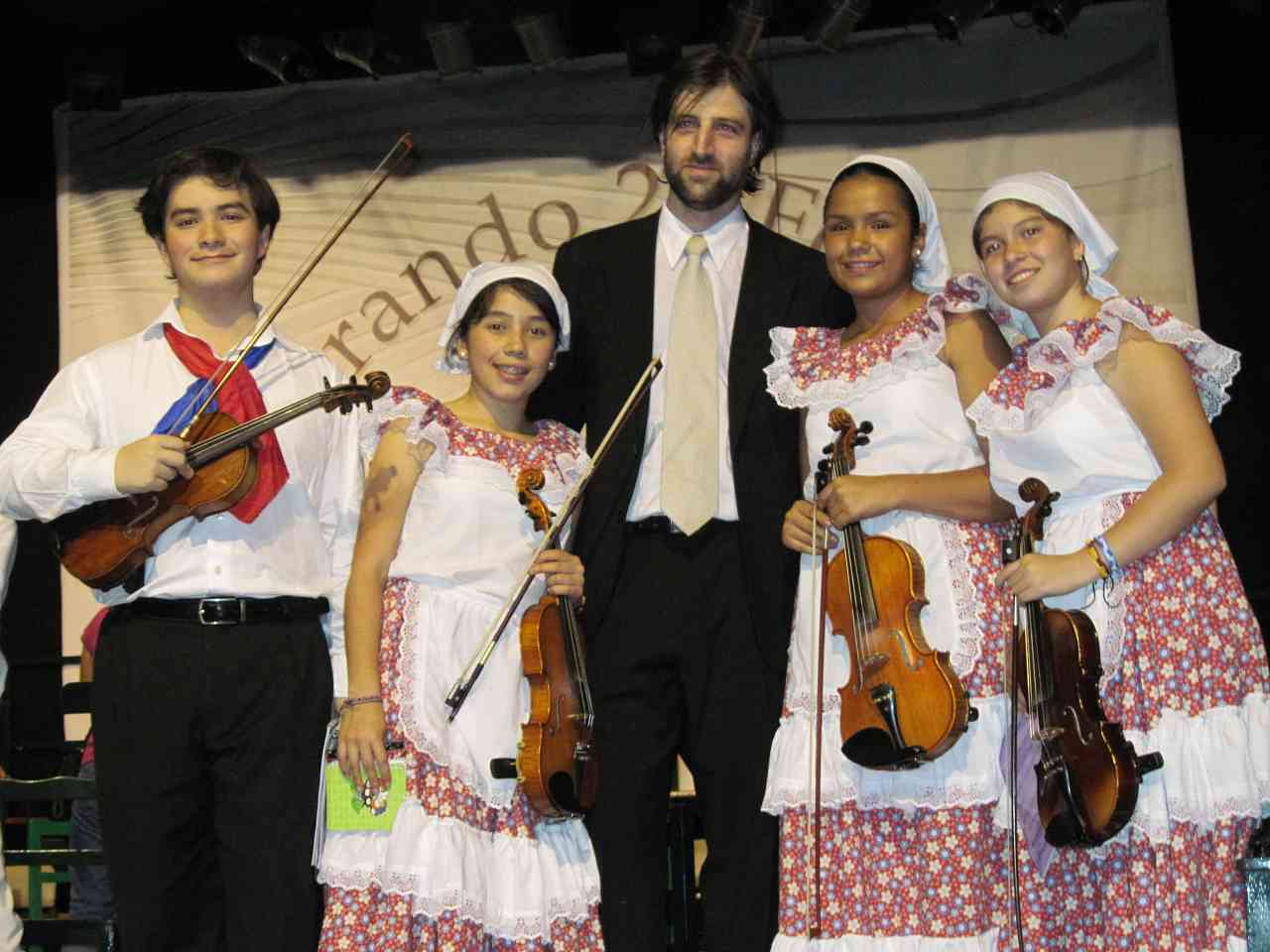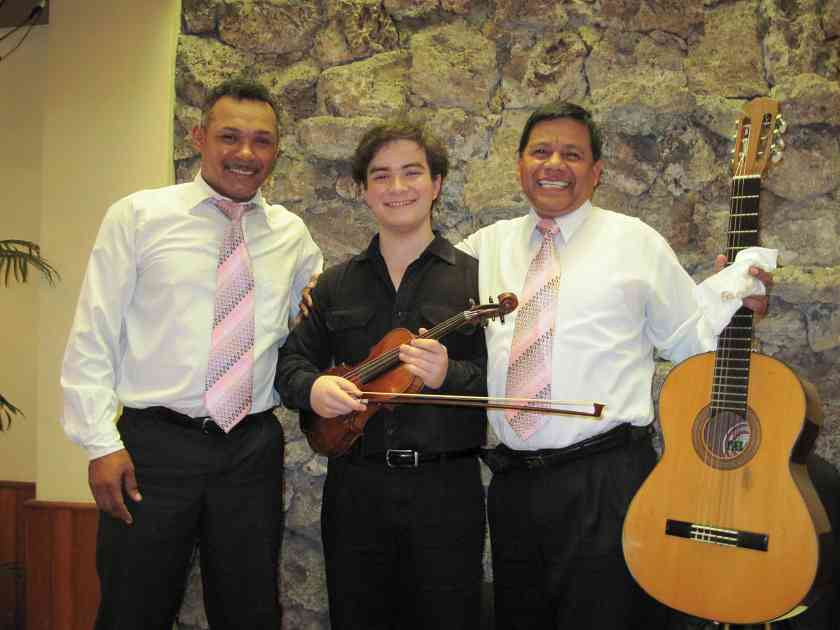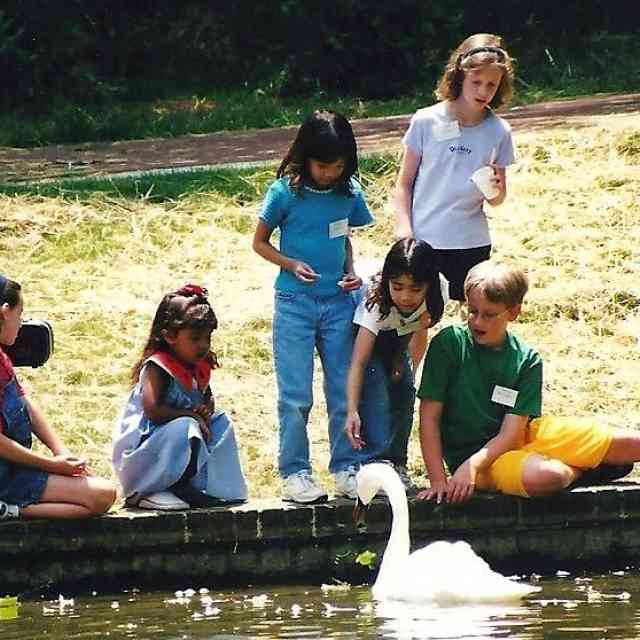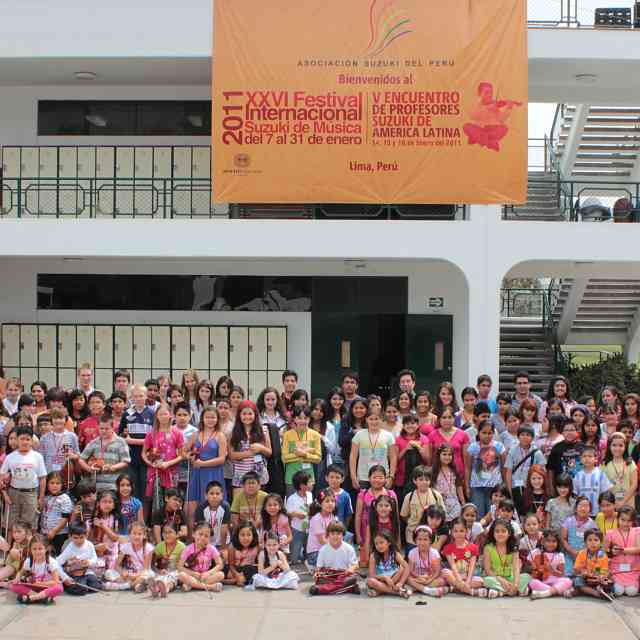
David, an American student of Doris Koppelman, with Conductor Dario and Colombian students at the XXV Festival International in Lima, Peru.
From the Suzuki Association of Peru: Caroline Fraser and Roberta Centurion
I Encuentro de Alumnos Suzuki de América Latina
(The First Latin American Suzuki students “Get-together”)
January 9th through the 12th, 2010, Lima, Peru
This was a historic occasion for Suzuki programs in the Americas and the result of a long-time dream of the Latin American Suzuki teachers. An “Encuentro” is literally a “meeting together.” Children from 11 Latin American countries from diverse cultures and backgrounds traveled to Lima, Peru, to share their music and experiences and to form the First Latin American Suzuki Students’ Orchestra.
The idea of having an all Latin American Suzuki Orchestra was born during our Latin American Teachers’ Conferences and was further motivated by the success of the Latin American Ensemble at the 2008 SAA Minneapolis Conference. During the 2009 Suzuki Association of Peru annual festival representatives from each participating country enthusiastically proposed the project as a way to help celebrate the 25th International Festival to be held by the Suzuki Association of Peru.
Without any idea of how much work it would entail, what it would cost and all that would be involved, we charged ahead. Each country sent us an arrangement of their traditional music, which was then sent out to the country representatives. Each country devised a process for selecting the children who would attend, rehearsed the children and helped make the travel and accommodation arrangements. There were several false starts as some music had to be transposed and some parts, including the conductor’s score, were missing! Pianists would either play on multiple electric pianos, or sing in the choir and play percussion instruments. Each country would provide the pianists for their piece. The music was scored for string orchestra, recorders, flutes, guitars and percussion; the Peruvian piece included the children playing the traditional panpipes.
Flor Canelo from Cusco and Caroline Fraser in Lima coordinated these initial stages throughout the year, with unconditional support from a local team of teachers (including Charo Kong, Lindsey Pre, Maria Luisa Labarthe, Ximena Marky, Luciana Castillo, Cristina Pinto) and our invaluable Association secretary, Deisy Cortera. They helped take care of the logistics: arranging a concert in a public place requires endless paperwork in Latin America. “Almost frantic” phone calls were made across the continent (thank you, SKYPE): “How many first violins do you have? Can you confirm how many children are coming?”
Children in participating countries rehearsed their parts, sometimes on their own, sometimes in ensemble. Teachers volunteered their time to help. We had asked that the music be memorized. Parents made the commitment to travel, and each country decided on a traditional dress for the Gala Concerts. In Peru it was decided that the children would wear the traditional dress of the three main regions of the country: the jungle, the mountains and the coast.
Many of the children also registered to participate in the festivals surrounding the Encuentro. The decision was made to start rehearsing these children in a special workshop during the festival. Dario Dominguez from Buenos Aires, Argentina, agreed to conduct and teachers were asked to lead the sectionals, including a vocal teacher to work with the choir, and Kike Pinto from Cusco to work with the children on panpipes.
We were anxious to see how this orchestra of 170 children, including some young book two students, would sound. The youngest participant was four-year-old Catalina who had traveled with her mother from Patagonia, Argentina! At the first rehearsal, Dario was surprised at how well the children were prepared. Many had come with all eleven pieces memorized! The children rehearsed with discipline and perseverance.
After only one day of full rehearsal with all children present, we took the children to perform in Comas, an economically disadvantaged district in Lima where the public does not have access to concerts and music lessons. This was an emotional experience for everyone. The church was packed with people standing around the sides and at the back. The doors at the entrance were left open so that the public standing outside could also hear. The audience clapped with the music, sang and wouldn’t let us go. They cheered when Dario dipped into his briefcase to search for a score for yet another encore. The performers were moved to be received with such warmth and passion.
The following day was the Gala Concert in the Auditorium Santa Ursula in San Isidro. The children looked radiant and colorful as they came on-stage by country in their national dress accompanied by their flag. The sole representative of the United States, David Morales Boroff, borrowed a flag from the U.S. Embassy and took a bow with his mother, Silvia. The orchestra delighted the audience and the Suzuki Association of Peru received an award from the Peruvian Ministry of Education.
The Encuentro was far more than children coming together to play in an orchestra: for many children it was their first time in a foreign country; for many Peruvians it was their first time in the capital city, and for all children it was their first time to be with so many children from so many different countries. Music brought everyone together. As the children bade each other goodbye, exchanging parts of their traditional dress, we were made aware of the friendships and bonds which had been formed. The children demonstrated a pride in their national and regional identities and yet were united through music. Surely this was Dr Suzuki’s dream: universal understanding through music.
XXV Festival International, Lima, Peru, January 4-30, 2009
Celebrating 25 Suzuki International Festivals!
- Courses with official recognition from the Peruvian Ministry of Education:
Peruvian educators have to continue their professional enrichment accumulating “credits.” The courses offered through the Suzuki Association of Peru can now count for this official credit.
- Participation from the Peruvian jungle for the first time:
Thanks in part to a scholarship agreement with the Ministry of Education, and an agreement with the National System of Youth Orchestras, four teachers from the jungle city of Iquitos were able to travel and take teacher training courses. The only way to travel to Lima from Iquitos is by river and road, which takes a few days, or by plane which is expensive for local people. The participants took courses in Early Childhood Education, recorder, violin and double bass. Thanks to a generous donation from a Suzuki piano teacher in California, Gretchen Klein, Daniel Manrique attended on a full scholarship with his airfare paid. He was so enthusiastic about his courses that he returned to Iquitos determined to host the Suzuki Association of Peru’s next National Workshop in his city. This would be the first such workshop in the jungle region of the country.
- Dalcroze workshop for teachers and students for the first time:
Clises Mulatti from Brazil taught an introductory course to more than 60 teachers. This demonstrates the level of interest in music education in Latin America and the scarcity of opportunities to learn.
- Participation from the USA, Canada, Europe, 12 Latin American countries and many parts of Peru:
Participants travelled from Argentina, Bolivia, Brasil, Chile, Colombia, Costa Rica, Ecuador, México, Paraguay, Uruguay, Venezuela, USA, Scotland and Canada. In Perú the regions of Ancash, Apurímac, Arequipa, Ayacucho, Cajamarca, Cusco, Huancavelica, Huánuco, Ica, Junín, La Libertad, Lambayeque, Loreto, Piura, Puno, Tacna and Lima were represented.
- Of the 300 teacher participants more than a third attended on scholarships thanks to our donors.
The Suzuki Association of Peru believes that its events must be accessible to all. In a country where 50% of the population lives in poverty this necessitates a viable scholarship program.
- Of the 400 student participants more than a quarter attended on scholarships.
The British Peruvian Cultural Association made a generous donation to our scholarship fund in order to help disadvantaged families attend the festival.
Many teachers were enrolled in general education courses such as Early Childhood Education, Talent Education, Kodaly and Dalcroze.
These courses are for teachers who do not necessarily have a musical background but who want to enrich their own experiences and those of the children they teach.
- Kodaly 2 workshop was offered in addition to Kodaly 1.
More than 60 teachers were enrolled in each course. The teacher trainer Lydia Mills from California delighted the participants with an ample repertoire of songs and games in Spanish, demonstrating how to introduce music literacy in the classroom.
- More than 80 participants were enrolled in philosophy.
The Suzuki philosophy is for everyone!
- Guitar Book 9 and flute Book 12 were taught.
Eugenia Aizaga travelled from Ecuador to study Flute Book 12 with Kelly, and MaryLou offered Guitar Book 9 to participants from Argentina and Peru.
- Tanya Carey traveled with her daughter Trina and grandchildren Tatum and Logan.
They gave an inspiring family concert (3 generations of cellists!) and Logan performed a Bk 7 Graduation Concert.
Doris Kopelman traveled with her student David and his mother Sylvia.
David gave a wonderful solo concert, played solos on all the daily student recitals and played with the Latin American students’ orchestra.
- Amongst the participants were self taught musicians from remote areas of Peru.
If you live in a place where there are no music teachers and you want to learn, what can you do? Participants from Huancavelica in the Andes and the city of Iquitos in the jungle told me that they had learnt to play their instruments with the help of the internet and occasional tourists. They are now determined to share their knowledge with their local communities and build music programs.
- Practice teaching component continues to be an obligatory part of every unit beyond Book One.
Every participant beyond bk1 has welcomed the opportunity to give a lesson and receive feedback on her teaching from the teacher trainer.
- Check our videos and photos on:
- Facebook: Asociación Suzuki del Perú
- YouTube: AsociacionSuzukiPeru
- Thanks to our dedicated SAA Teacher Trainers:
Tanya Carey, Virginia Dixon, Caroline Fraser, Doris Koppelman, Nancy Lokken, Eduardo Ludueña, Marilyn O’Boyle, Fernando Piñero, MaryLou Roberts, Mary Halverson Waldo and Kelly Williamson for their professional expertise and generosity of spirit.
- Thanks to our main sponsors:
This festival would not have been possible without the generous sponsorship from the Suzuki Association of the Americas. Thanks also to Newton College, the US Embassy in Peru, the British Peruvian Cultural Association and Latin American Scholarship Fund donors from the United States, Canada, England, Scotland, Germany and Norway. In addition, a special thank you to our dedicated teachers, office staff, Suzuki friends and families in Peru who continue to support our festival. As Dr Suzuki always emphasized, working together we can help create a better world!
Anunciamos el XXVI Festival Internacional, Lima, Peru, Enero 7-31, 201I,
y
El V Encuentro para Profesores Suzuki de América Latina
Nos vemos allá!
www.suzukimusica.com.pe

David with Peruvian musicians at XXV Festival International, Lima, Peru.








